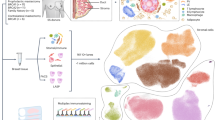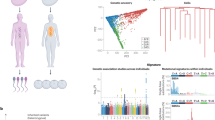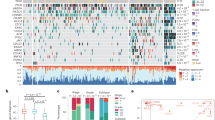Abstract
Breast cancer in men is rare — among the risk factors that have been identified are a family history of breast cancer and evidence of androgen insufficiency. We report a family in which two brothers who both developed breast cancer had clinical and endocrinological evidence of androgen resistance. Sequence analysis revealed a mutation in the androgen receptor gene on the X chromosome, within the region encoding the DNA binding domain. This is the first report of a germline mutation in a member of the steroid/thyroid hormone receptor superfamily associated with the development of cancer.
This is a preview of subscription content, access via your institution
Access options
Subscribe to this journal
Receive 12 print issues and online access
$209.00 per year
only $17.42 per issue
Buy this article
- Purchase on Springer Link
- Instant access to full article PDF
Prices may be subject to local taxes which are calculated during checkout
Similar content being viewed by others
References
Crichlow, R.W. & Galt, S.W. Male breast cancer. Surg. Clinics N. America 70, 1165–1177 (1990).
Rose, D.P. Endocrine epidemiology of male breast cancer. Anticancer Res. 8, 845–850 (1988).
Thomas, D.B. et al. Breast cancer in men: risk factors with hormonal implications. Am. J. Epidemiol. 135, 734–748 (1992).
Rosenblatt, K.A. et al. Breast cancer in men: aspects of familial aggregation. J. natl. Cancer Inst. 83, 849–853 (1991).
Lenfant-Pejovic, M.-H., Mlika-Cabanne, N., Bouchardy, C. & Auquier, A. Risk factors for male breast cancer: a Franco-Swiss case control study. Int. J. Cancer 45, 661–665 (1990).
Malkin, D. et al. Germ line p53 mutations in a familial syndrome of breast cancer, sarcomas, and other neoplasms. Science 250, 1233–1238 (1990).
Hall, J.M. et al. Linkage of early onset familial breast cancer to chromosome 17q21. Science 250, 1684–1689 (1990).
Griffin, J.E. Androgen resistance-the clinical and molecular spectrum. N. Eng. J. Med. 326, 611–618 (1992).
McPhaul, M.J. et al. Molecular basis of androgen resistance in a family with a qualitative abnormality of the androgen receptor and responsive to high dose androgen therapy. J. clin. Invest. 87, 1413–1421 (1991).
LaSpada, A.R., Wilson, E., Lubahn, D.B., Harding, A.E. & Fischbeck, K.H. Androgen receptor gene mutations in X-linked spinal and bulbar muscular atrophy. Nature 352, 77–79 (1991).
Harris, E.L. Genetic epidemiology of hypospadias. Epidemiol. Rev. 12, 29–40 (1990).
Frydman, M., Grieber, C. & Cohen, H.A. Uncomplicated familial hypospadias: Evidence for autosomal recessive inheritance. Am. J. med. Genet. 21, 51–55 (1985).
Evans, R.M. The steroid and thyroid hormone receptor family. Science 240, 889–895 (1988).
Verp, M.S. & Simpson, J.L. Abnormal sexual differentiation and neoplasia. Cancer Genet. Cytogenet. 25, 191–218 (1987).
Pelletier, J. et al. WT1 mutations contribute to to abnormal genital system development and hereditary Wilms tumour. Nature 353, 431–434 (1991).
Pelletier, J. et al. Germline mutations in the Wilms tumor suppressor gene are associated with abnormal urogenital development in Denys-Drash syndrome. Cell 67, 437–447 (1991).
Green, S., Kumar, V., Theulaz, I., Wahli, W. & Chambon, P. The N-terminal DNA-binding “zinc finger” of the oestrogen and glucocorticoid receptors determines target gene specificity. EMBO J. 7, 3037–3044 (1988).
Mader, S., Kumar, V., de Verneuil, H. & Chambon, P. Three amino acids of the oestrogen receptor are essential to its ability to distinguish an oestrogen from a glucocorticoid-response element. Nature 338, 271–274 (1989).
Schena, M., Freedman, L.P. & Yamamoto, K.R. Mutations in the glucocorticoid receptor zinc finger region that distinguish interdigitated DNA binding and transcriptional enhancement activties. Genes Dev. 3, 1590–1601 (1989).
Demeter, J.G., Waterman, N.G. & Verdi, G.D. Familial male breast carcinoma. Cancer 65, 2342–2343 (1990).
Everson, R.B., Fraumeni, J.F. & Wilson, R.E. Familial male breast cancer. Lancet 1, 9–12 (1976).
Kozak, F.K., Hall, J.G. & Baird, P.A. Familial breast cancer in males. Cancer 58, 2736–2739 (1986).
Marger, D., Urdaneta, N. & Fischer, J.J. Breast cancer in brothers. Cancer 36, 458–461 (1975).
Teasdale, C., Forbes, J.F. & Baum, M. Familial male breast cancer. Lancet i, 361–362 (1976).
Author information
Authors and Affiliations
Rights and permissions
About this article
Cite this article
Wooster, R., Mangion, J., Eeles, R. et al. A germline mutation in the androgen receptor gene in two brothers with breast cancer and Reifenstein syndrome. Nat Genet 2, 132–134 (1992). https://doi.org/10.1038/ng1092-132
Received:
Accepted:
Issue Date:
DOI: https://doi.org/10.1038/ng1092-132
This article is cited by
-
Clinical characteristics, AR gene variants, and functional domains in 64 patients with androgen insensitivity syndrome
Journal of Endocrinological Investigation (2022)
-
Trinucleotide repeat expansions in human breast cancer-susceptibility genes: relevant targets for aspirin chemoprevention?
Clinical and Translational Oncology (2016)
-
Three novel and two known androgen receptor gene mutations associated with androgen insensitivity syndrome in sex-reversed XY female patients
Journal of Genetics (2016)
-
Androgeninsensitivität
Medizinische Genetik (2011)
-
CAG repeat length polymorphism in the androgen receptor gene and breast cancer risk: data on Indian women and survey from the world
Breast Cancer Research and Treatment (2011)



